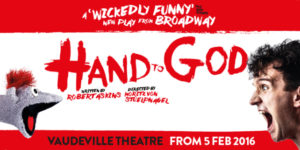
Into the Hoods Remixed
Zoonation
Peacock Theatre
06/05/16
 (4 / 5)
(4 / 5)
Audio file of review
Within current theatre, diversity is a huge conversation topic and issue in the industry.
When you hear ‘hip hop’, ‘street dance’ and ‘the hood’ our minds across the board think of stereotypical urban scenes, characters and storylines. ZooNation are a fantastic company – from difference in race, ability, gender, body types, the troupe of dancers range in all these aspects, and not to make a point but because they are talented, passionate and perfect for the roles.
It is refreshing to see that there is comedy played on the stereotypes that is thought of urban areas and ZooNation uses the ‘Into the Woods’ story to transform a once predominantly white European Grimm Fairy-tale–esque story into a modern and comical production.
As a former street dancer, I have noticed over the years the transformation of the industry. Coming from a popular era where street dance was fluid, to the past few years where popping and locking has become more common, ZooNation combine not only choreography that you cannot take your eyes off, but they introduce contemporary dance, break dance, even 1920’s flapper moves. This with the combination of a range of music from the more hard core hip hop, to 70’s favourites, the company creates a clever illusion of this fantastical world.
It is usual that a play has one main character, or a performer who stands out. Into the Hoods Remixed makes this decision hard. The concept of the story line – a fairy-tale land where we meet all our favourite characters from Cinderella to Rapunzel [Or in this case, Spinderella and Rap-un-zel] the principal characters are abundant – and so are the performers. Not a single performer is unable to embody whatever character they are, and this is implemented through their dancing, never breaking character. This troupe not only compete for the limelight, forcing us to love them all for each individuality, but also show that as a team and a dance group, they connect well and play off one another with great skill.
The set itself is fantastic – well constructed visuals of tower blocks, cartoon characters running through the backdrop and minimalist prop and staging helps us to create the scene. In addition to this, the voice over narrator occasionally setting the scene and the performers brilliant execution, Into the Hoods Remixed does nothing but leave you astounded and with a huge grin on your face.




